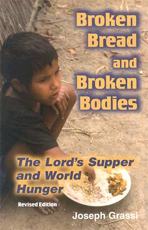"The altar of God, the Eucharist, provides divine rejuvenation when celebrated according to Jesus' intention as a covenant of justice for the poor and the hungry," writes Joseph A. Grassi, professor emeritus of the Department of Religious Studies, Santa Clara University in California. In this revised edition of a 1985 volume, he lays out the connections between the broken bread of the Lord's Supper and the broken bodies of the hungry, which according to recent estimates includes the 15 million people around the world who die each year of starvation.
Grassi examines the religious, political, social, and economic situation in first-century Israel and finds that the poor, the marginalized, and the oppressed were the ones that Jesus spoke to with his "listening heart," a term from the Wisdom tradition. He taught his disciples by example that they must serve the hungry, thirsty, poor, and sick. Through his table fellowship, he reached out to those who had nothing or were viewed as unclean or unworthy.
Grassi's main point: service of those who were suffering — including handing out bread to the poor — has always been part of what it means to be a Christian. The main ritual of the faith echoes this emphasis: "Participation in the Eucharist can help mobilize effective individual and community action to promote the great miracle of sharing necessary to bring an end to hunger." Grassi, who for over 20 years coordinated the Skip-A-Meal program to serve the hungry and needy, presents tips on congregational activities to combat world hunger.
